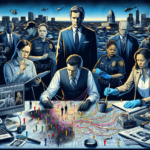From the Perspective of a Prosecutor: Insights on Seeking Justice for Victims and Communities
As a prosecutor, my role is to seek justice for victims and communities by holding offenders accountable for their actions. It is a challenging but incredibly rewarding job that requires dedication, commitment, and a deep sense of empathy for those who have been wronged.
Understanding the Role of a Prosecutor
Prosecutors are responsible for representing the government in criminal cases. Our primary goal is to ensure that justice is served by prosecuting those who have violated the law and protecting the rights of victims. We work closely with law enforcement agencies, victims, and witnesses to gather evidence, build cases, and advocate for the interests of the community.
One of the key responsibilities of a prosecutor is to assess the strength of the evidence and determine whether a case should proceed to trial. This involves carefully reviewing police reports, witness statements, physical evidence, and other relevant information to determine the likelihood of a successful prosecution.
Challenges Faced by Prosecutors
Prosecutors face a myriad of challenges in their quest for justice. One of the most significant challenges is dealing with the emotional toll of working on cases involving victims of violent crimes. It can be incredibly difficult to hear the stories of those who have been hurt and to see the impact that crime has on their lives and the lives of their loved ones.
Another challenge that prosecutors face is the pressure to secure convictions in high-profile cases. There is often public scrutiny and media attention surrounding these cases, which can make the job even more stressful and demanding. Despite these challenges, prosecutors remain steadfast in their commitment to seeking justice for victims and holding offenders accountable for their actions.
Empathy and Understanding as Essential Tools
Empathy and understanding are essential tools for prosecutors as they navigate the complexities of the criminal justice system. By putting themselves in the shoes of victims and understanding the impact that crime has on communities, prosecutors can better advocate for the interests of those who have been wronged.
It is important for prosecutors to listen to the stories of victims with compassion and to ensure that their voices are heard in the courtroom. By building a strong rapport with victims and witnesses, prosecutors can create a supportive environment that encourages them to come forward and seek justice for the crimes that have been committed against them.
Collaboration and Communication with Stakeholders
Prosecutors work closely with a wide range of stakeholders in the criminal justice system, including law enforcement agencies, victim advocates, defense attorneys, judges, and community organizations. Collaboration and communication are key to ensuring that cases proceed smoothly through the legal process and that victims receive the support and assistance they need.
By building strong relationships with these stakeholders, prosecutors can create a network of support that enhances the effectiveness of their work. This collaboration also helps to ensure that victims are kept informed of the progress of their cases and are able to participate in the legal process in a meaningful way.
The Importance of Seeking Justice for Victims and Communities
Seeking justice for victims is central to the mission of prosecutors. By holding offenders accountable for their actions and ensuring that they are punished for the harm they have caused, prosecutors help to restore a sense of justice and closure for those who have been wronged.
Prosecutors also play a critical role in protecting the interests of communities by working to deter crime and ensure public safety. By prosecuting offenders and seeking appropriate punishments, prosecutors send a clear message that criminal behavior will not be tolerated and that those who violate the law will face consequences for their actions.
Conclusion
Being a prosecutor is not just a job, it is a calling. It requires a strong sense of justice, a commitment to serving the community, and a deep empathy for those who have been harmed. By working tirelessly to seek justice for victims and communities, prosecutors play a vital role in upholding the principles of justice and ensuring that the rights of all individuals are protected.


